Jake's View | Southeast Asia's economies doing fine without using 'hot air' strategies
You can take it as certain that Mario Draghi's prescriptions for a "consistent common strategy" will not include Indonesian style increases in energy prices and interest rates.

"2015 needs to be the year when all actors in the euro area - governments and European institutions alike - deploy a consistent common strategy to bring our economies back on track."
In his first major economic policy decision, Indonesian President Joko Widodo raised subsidised petrol and diesel prices by more than 30 per cent late on Monday to help fund his reform agenda and tackle the country's budget and current account deficits.
You can take it as certain that Mario Draghi's prescriptions for a "consistent common strategy" will not include Indonesian style increases in energy prices and interest rates.
This microphone addict, the grand talk master of the European hot air show, has long proved himself bereft of any idea other than printing more money and urging governments to go deeper into debt.
